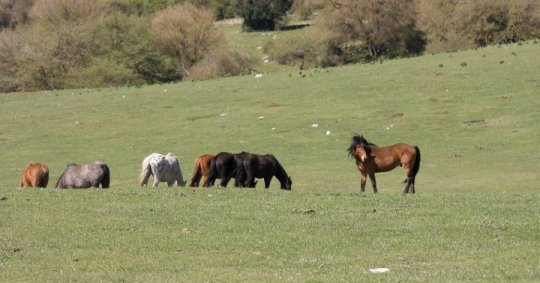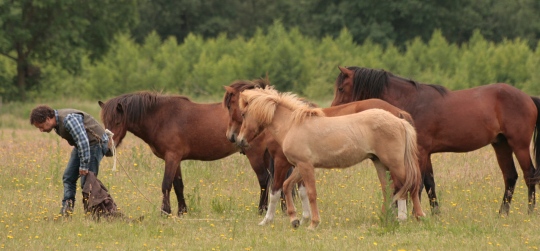The horse as he is

Free-roaming horses in Italy, 2010 – Pic by José De Giorgio-Schoorl
How many people actually really know the horse as he is? This is the more important question. A lot of people think that in nature horses are reactive animals, always in an emotive inner state, searching for their leader to have guidance. False. Horses become highly reactive/emotive due to human breeding, management and activities. In nature horses are cognitive/emotional animals. They are thinking animals. Each their own balanced individual, capable of belonging to something bigger as a herd.
But what does cognition really mean? Cognition usually refers to the cognitive mechanisms involved in learning, memory, perception, decision-making and other. Cognitive ethology starts from the animal as sentient being. In the same way, the zooanthropological philosophy starts from considering animal as dialogical subject and not as passive object.
Equitation, modern or classical, more or less “natural”, using negative or positive reinforcement, has always seen the horse as a machine incapable of thinking. An object to condition and to control, this way depriving this animal of its natural cognitive abilities. This is mainly due to the early history of western philosophy that reflects a tendency to see animals as living being with lacking rationality.
Aristotle defined “human” as “the rational animal”, thus rejecting the possibility that any other species is rational (Aristotle Metaphysics). Aquinas believed that animals are irrational because they are not free (Aquinas Summa Theologica). Centuries later, Descartes defended his distinction between humans and animals based on the belief that language is a necessary condition for mind; on his view animals are soulless machines (Descartes Discourse on the Method). Locke agreed that animals cannot think, because words are necessary for comprehending universals (Locke Essay Concerning Human Understanding). Following in this tradition, Kant concluded that since they cannot think about themselves, animals are not rational agents and hence they only have instrumental value (Kant Lectures on Ethics). The question of animal rationality is related to a number of different questions about animals, including whether they engage in action, wether they have intend, or intentionality. Views about animal rationality can also have consequences for views about animal autonomy and moral status (Andrews, 2011).
Horse cognition research began collecting the first data in recent years; mixed with equine zooanthropology pushed with vigor into a new light, not only from the scientific point of view, but also from a cultural and ethical (De Giorgio, 2010; De Giorgio, Schoorl, 2012).
For example, under feral or semi-feral situation, in familiar group, horses seem to have important cognitive skills during social exploration of novel objects, expressed with specific behaviours and caratheristics. The first data analysis about our recent observations, seem to indicate a difference in permanent and non-permanent groups, during investigative processes of novel objects. The results show that group-stability, in which individuals take each other into account to avoid tension, offers a better exploratory process and thus a better cognitive experience (De Giorgio et al., 2012, sent to ASAB Winter Meeting titled “Cognition in the Wild” and to the Dutch Society of Behavioural Biology Annual Meeting).
Social cognitive abilities in horses are even more interesting when applied to the horse-human relationship. There is indeed evidence that horses detect human cues and attentional states (Krueger et al. 2011).
Only when you give to the horses the space, the context and the time to create their own experience, their own learning, their own sharing, focussing our own (human) intentions on their quality of life, only then will you see the horse as he is.
In the equine zooanthropological approach we don’t stimulate cognition, but we preserve innate cognitive abilities. We preserve the horse as he is.
As Gabriele Bono stressed in the preface of Proceedings about Italian Society of Veterinary Physiology Meeting 2012, looking at the cognitive abilities of animals should be a good occasion to face anthrozoology challenges beyond animal welfare, into animal quality of life.
Authors: Francesco De Giorgio, José De Giorgio-Schoorl
________
Francesco De Giorgio
Born in 1965 in Italy, Francesco De Giorgio is a forward thinker about animal ethics as well as a biologist, ethologist and applied behavioural researcher. Francesco is member of the Ethics Commitee of ISAE (International Society of Applied Ethology), specialized in equine and canine ethology. He is also founder, developer and facilitator at the Learning Animals | International Institute for Zooanthropology, where he focuses principally on the study of animal-human interaction, ethics, animal personal growth and rehabilitation.
Graduating from Parma University in 1989, Francesco began his career as an independent field researcher, supporting several universities whilst indulging his lifelong passion for horses and dogs as an Equine and Canine Learning Professional – helping owners to enhance their relationships with animals.
Described by International School of Ethology (Erice, IT), Director Danilo Mainardi as “a man who works with his head and his heart and his hands”, Francesco walks the talk – integrating scientific knowledge into ethical day-to-day practice.
An expert in equine and canine welfare, Francesco provides expert support for institutions occupied with animal Health and Welfare (e.g. in equine mistreatment cases), has served on a number of ethics committees, and acts as an advisor to courts, police and equine rehabilitation centres, in animal abuse cases and rehabilitations post-abuse.
Much sought-after as both a speaker and lecturer, Francesco speaks regularly on ‘Cognitive Ethology in the Animal-Human Relationship’. He also lectures at several universities and has presented to numerous conferences and symposia on ethology, cognition and zooanthropology and published the books “Horse- Human dictionary” (in italian) and “The Cognitive Horse” (in english and italian).
José De Giorgio-Schoorl
Francesco’s partner in both life and work, Dutch born José Schoorl personifies the bridge between equine perception and human understanding. Their shared passion for horses and keen insight in social dynamics brought them together and today they live in the Netherlands with their eight horse companions, four dogs and two cats.
After many years of change adviser and personal development consultant, she is, today, a renowned proponent of the zooanthropological approach, working for the change in awareness and understanding of the Animal-Human Relationship.
As consultant and teacher at the Learning Animals Institute for Zooanthropology, José strives to improve people’s understanding of cognition and relationship dynamics, and in so doing to enhance their relationship with animals.
Contending that a firm grasp of equine cognition is the vital first step to understanding horses’ behaviour, José is a real force for change; inspiring and promoting fresh thinking in her writing and in her lectures and creating effective personal growth trajectories for individuals through free interaction with horses.
A regular guest lecturer and speaker in zooanthropology and personal growth, José has presented to conferences and symposia throughout Europe.
Bibliography
Andrews, K. Animal Cognition, The Stanford Encyclopedia of Philosophy, 2011
Aquinas, S. T. Summa Theologica. Grand Rapids, Christian Classics, 1981.
Aristotle. The Metaphysics. New York, Penguin Classics, 1999.
Bono G. Looking at animal cognitive abilities allow us to face Anthrozoology challenges. Proceedings Italian Society of Veterinary Physiology Meeting (So.Fi.Vet.), 2012.
Descartes, R. A Discourse on the Method. Oxford, Oxford University Press, 2006.
De Giorgio, F. Dizionario Italiano/Cavallo – Cavallo/Italiano, 2010
De Giorgio, F., Schoorl, J. Why isolate during training? Social learning and social cognition applied as training approach for young horses (Equus caballus), 2012
De Giorgio, F., School J., Saviani G., Palandri L., Tonarelli E. Equine social cognition: differences in the social exploratory process comparing free-roaming and domestic horses, 2012
Kant, I. “Duties to Animals and Spirits.” Lectures on Ethics. L. Infield. New York, Harper and Row, 1963: 239–241.
Krueger K., Flauger B., Farmer K., Maros K. Horses (Equus caballus) use hunam local enhancement cuesand adjust to human attention. Anim Cogn, 14: 187-203, 2011
Locke, J. An Essay Concerning Human Understanding. Pomona, Italy: Pomona Press, 2007




















